Report: Hospitality Provisions in Travel and Tourism Sector
VerifiedAdded on 2020/01/15
|18
|5492
|181
Report
AI Summary
This report delves into the crucial role of hospitality provisions within the travel and tourism sector. It explores the interrelationships between hospitality businesses and the wider travel industry, highlighting how hospitality companies like Ritz Carlton facilitate the operations of travel agencies such as Thomas Cook. The report examines the implications of both horizontal and vertical integration strategies, illustrating how these approaches impact the hospitality industry, increase market share, and enhance service offerings. It analyzes the advantages of integration, such as resource sharing, brand recognition, and improved customer service, while providing insights into the strategies employed by leading companies like Thomas Cook to navigate the competitive landscape. The report also discusses the various services provided by hospitality and tourism companies, including accommodation, food, beverages, leisure activities, and transportation, emphasizing how these offerings contribute to a comprehensive travel experience. Furthermore, it showcases how integration with financial institutions and insurance companies enhances the overall experience for travelers, and how the industry adapts to meet the needs of business and leisure travelers alike.
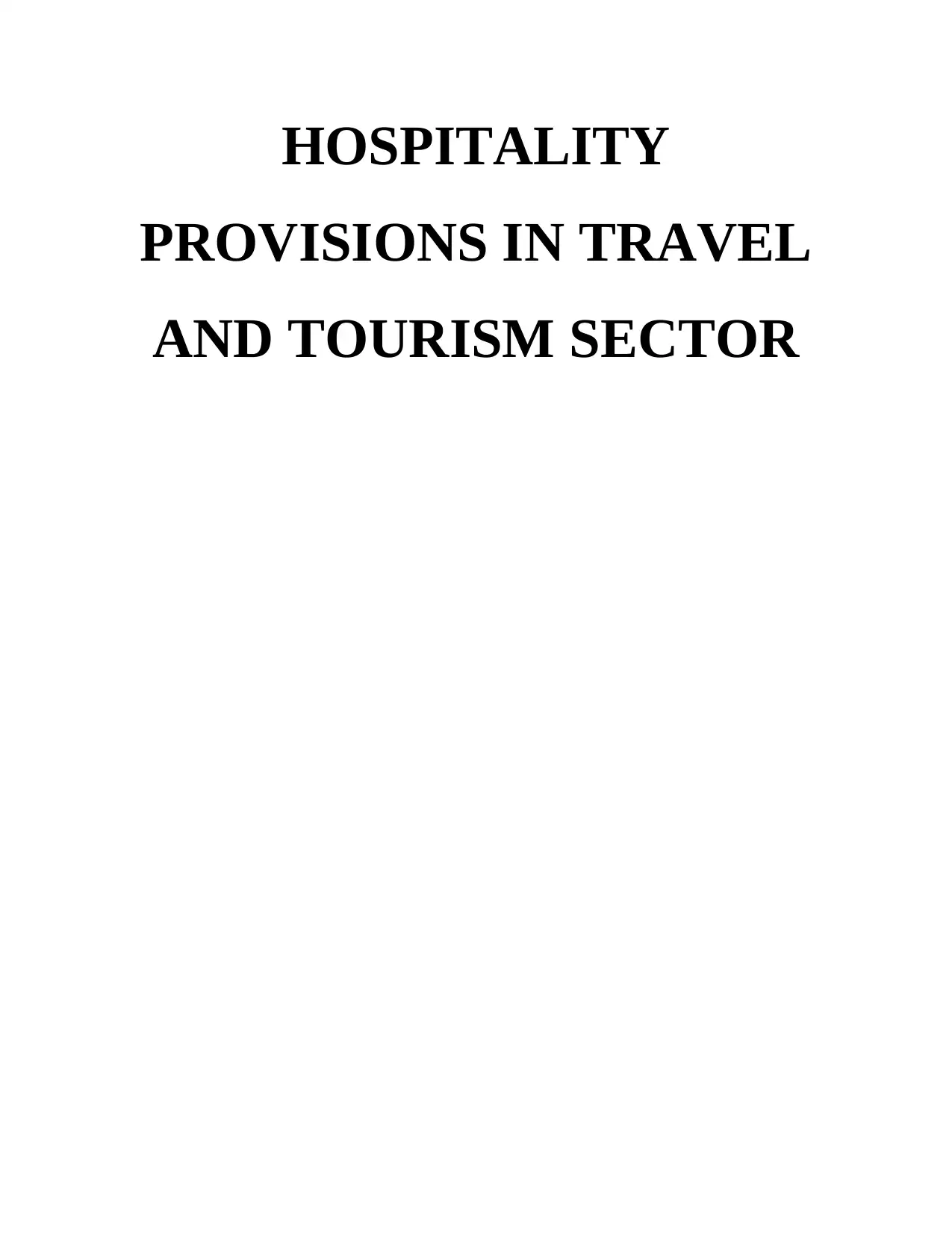
HOSPITALITY
PROVISIONS IN TRAVEL
AND TOURISM SECTOR
PROVISIONS IN TRAVEL
AND TOURISM SECTOR
Paraphrase This Document
Need a fresh take? Get an instant paraphrase of this document with our AI Paraphraser
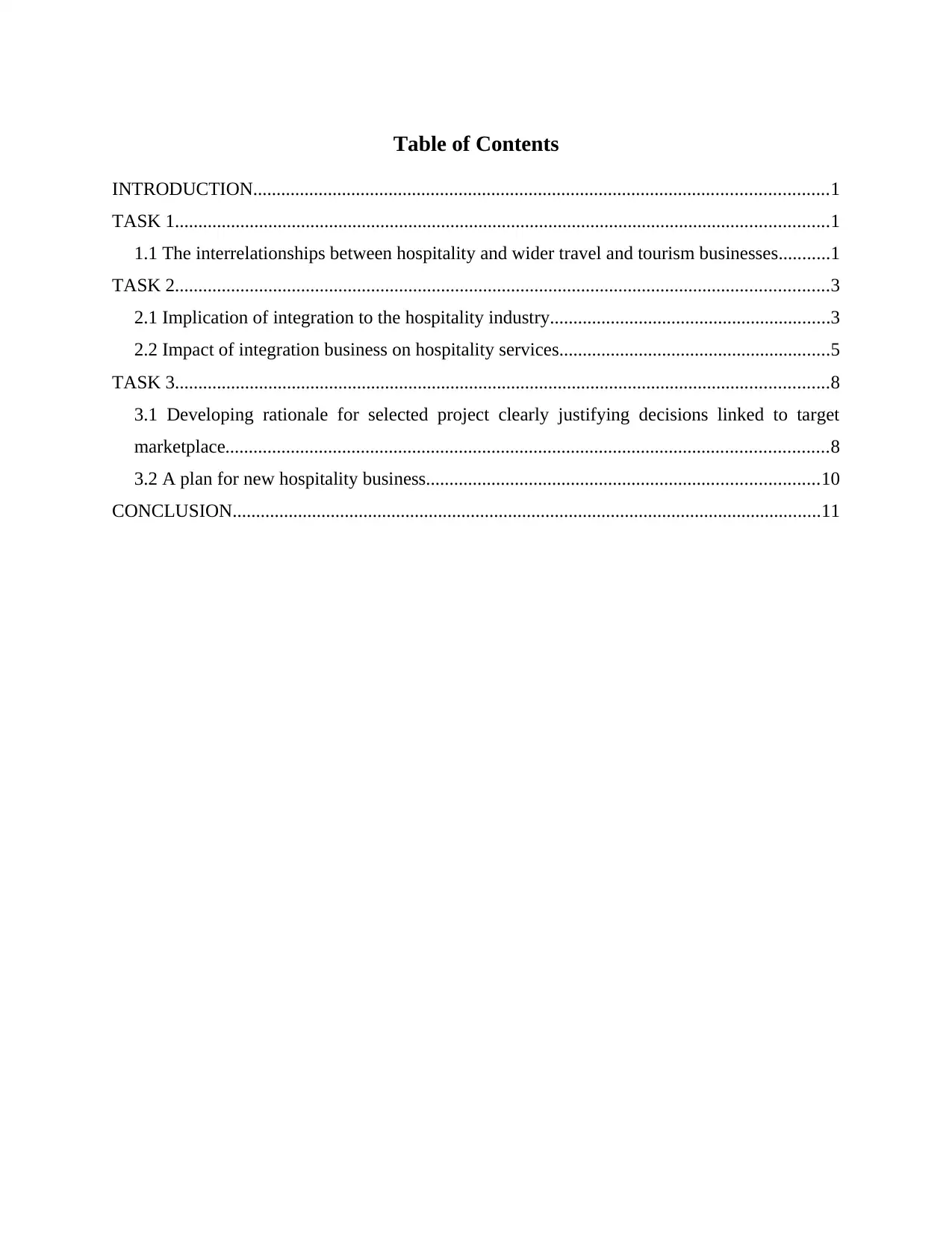
Table of Contents
INTRODUCTION...........................................................................................................................1
TASK 1............................................................................................................................................1
1.1 The interrelationships between hospitality and wider travel and tourism businesses...........1
TASK 2............................................................................................................................................3
2.1 Implication of integration to the hospitality industry............................................................3
2.2 Impact of integration business on hospitality services..........................................................5
TASK 3............................................................................................................................................8
3.1 Developing rationale for selected project clearly justifying decisions linked to target
marketplace.................................................................................................................................8
3.2 A plan for new hospitality business....................................................................................10
CONCLUSION..............................................................................................................................11
INTRODUCTION...........................................................................................................................1
TASK 1............................................................................................................................................1
1.1 The interrelationships between hospitality and wider travel and tourism businesses...........1
TASK 2............................................................................................................................................3
2.1 Implication of integration to the hospitality industry............................................................3
2.2 Impact of integration business on hospitality services..........................................................5
TASK 3............................................................................................................................................8
3.1 Developing rationale for selected project clearly justifying decisions linked to target
marketplace.................................................................................................................................8
3.2 A plan for new hospitality business....................................................................................10
CONCLUSION..............................................................................................................................11

⊘ This is a preview!⊘
Do you want full access?
Subscribe today to unlock all pages.

Trusted by 1+ million students worldwide
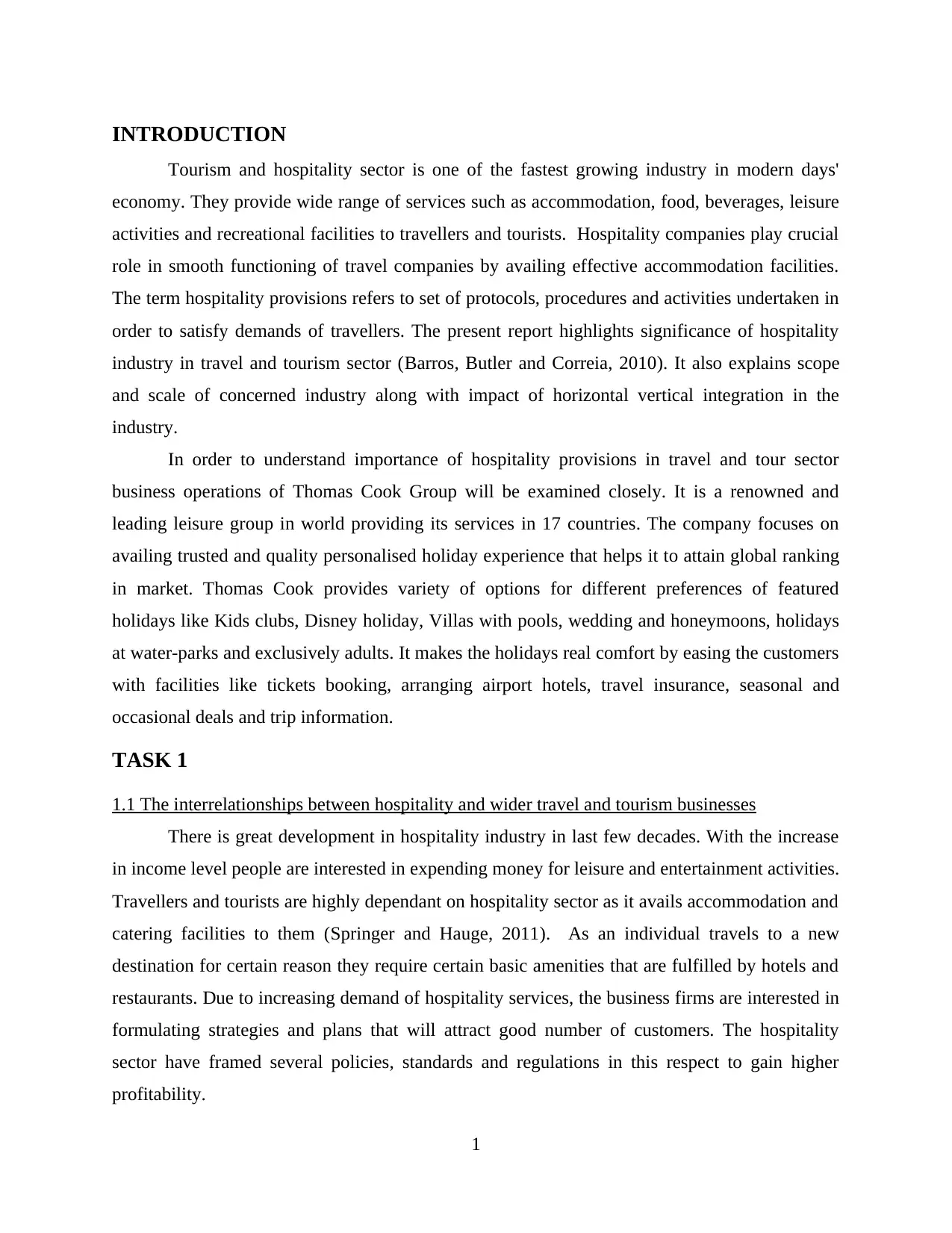
INTRODUCTION
Tourism and hospitality sector is one of the fastest growing industry in modern days'
economy. They provide wide range of services such as accommodation, food, beverages, leisure
activities and recreational facilities to travellers and tourists. Hospitality companies play crucial
role in smooth functioning of travel companies by availing effective accommodation facilities.
The term hospitality provisions refers to set of protocols, procedures and activities undertaken in
order to satisfy demands of travellers. The present report highlights significance of hospitality
industry in travel and tourism sector (Barros, Butler and Correia, 2010). It also explains scope
and scale of concerned industry along with impact of horizontal vertical integration in the
industry.
In order to understand importance of hospitality provisions in travel and tour sector
business operations of Thomas Cook Group will be examined closely. It is a renowned and
leading leisure group in world providing its services in 17 countries. The company focuses on
availing trusted and quality personalised holiday experience that helps it to attain global ranking
in market. Thomas Cook provides variety of options for different preferences of featured
holidays like Kids clubs, Disney holiday, Villas with pools, wedding and honeymoons, holidays
at water-parks and exclusively adults. It makes the holidays real comfort by easing the customers
with facilities like tickets booking, arranging airport hotels, travel insurance, seasonal and
occasional deals and trip information.
TASK 1
1.1 The interrelationships between hospitality and wider travel and tourism businesses
There is great development in hospitality industry in last few decades. With the increase
in income level people are interested in expending money for leisure and entertainment activities.
Travellers and tourists are highly dependant on hospitality sector as it avails accommodation and
catering facilities to them (Springer and Hauge, 2011). As an individual travels to a new
destination for certain reason they require certain basic amenities that are fulfilled by hotels and
restaurants. Due to increasing demand of hospitality services, the business firms are interested in
formulating strategies and plans that will attract good number of customers. The hospitality
sector have framed several policies, standards and regulations in this respect to gain higher
profitability.
1
Tourism and hospitality sector is one of the fastest growing industry in modern days'
economy. They provide wide range of services such as accommodation, food, beverages, leisure
activities and recreational facilities to travellers and tourists. Hospitality companies play crucial
role in smooth functioning of travel companies by availing effective accommodation facilities.
The term hospitality provisions refers to set of protocols, procedures and activities undertaken in
order to satisfy demands of travellers. The present report highlights significance of hospitality
industry in travel and tourism sector (Barros, Butler and Correia, 2010). It also explains scope
and scale of concerned industry along with impact of horizontal vertical integration in the
industry.
In order to understand importance of hospitality provisions in travel and tour sector
business operations of Thomas Cook Group will be examined closely. It is a renowned and
leading leisure group in world providing its services in 17 countries. The company focuses on
availing trusted and quality personalised holiday experience that helps it to attain global ranking
in market. Thomas Cook provides variety of options for different preferences of featured
holidays like Kids clubs, Disney holiday, Villas with pools, wedding and honeymoons, holidays
at water-parks and exclusively adults. It makes the holidays real comfort by easing the customers
with facilities like tickets booking, arranging airport hotels, travel insurance, seasonal and
occasional deals and trip information.
TASK 1
1.1 The interrelationships between hospitality and wider travel and tourism businesses
There is great development in hospitality industry in last few decades. With the increase
in income level people are interested in expending money for leisure and entertainment activities.
Travellers and tourists are highly dependant on hospitality sector as it avails accommodation and
catering facilities to them (Springer and Hauge, 2011). As an individual travels to a new
destination for certain reason they require certain basic amenities that are fulfilled by hotels and
restaurants. Due to increasing demand of hospitality services, the business firms are interested in
formulating strategies and plans that will attract good number of customers. The hospitality
sector have framed several policies, standards and regulations in this respect to gain higher
profitability.
1
Paraphrase This Document
Need a fresh take? Get an instant paraphrase of this document with our AI Paraphraser
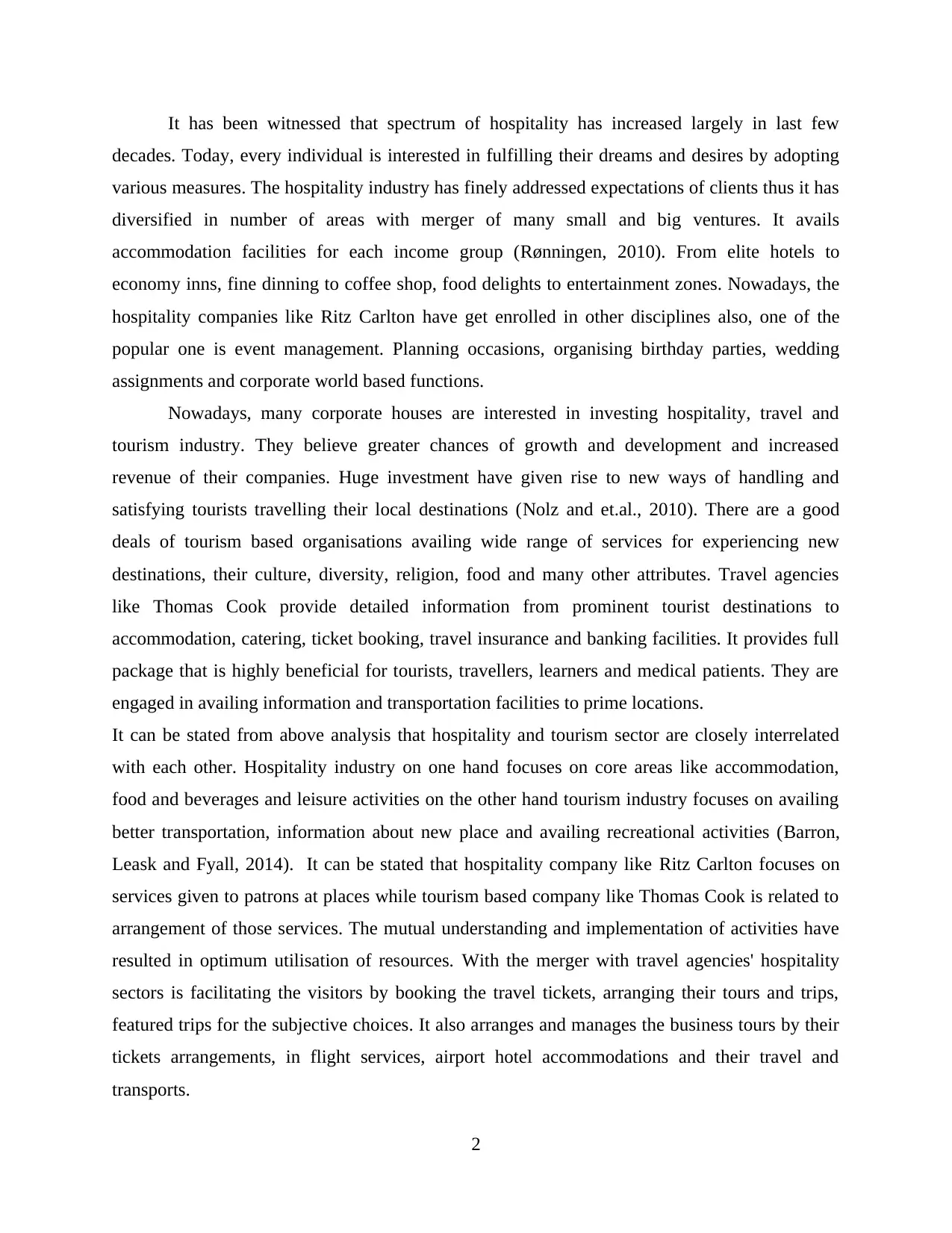
It has been witnessed that spectrum of hospitality has increased largely in last few
decades. Today, every individual is interested in fulfilling their dreams and desires by adopting
various measures. The hospitality industry has finely addressed expectations of clients thus it has
diversified in number of areas with merger of many small and big ventures. It avails
accommodation facilities for each income group (Rønningen, 2010). From elite hotels to
economy inns, fine dinning to coffee shop, food delights to entertainment zones. Nowadays, the
hospitality companies like Ritz Carlton have get enrolled in other disciplines also, one of the
popular one is event management. Planning occasions, organising birthday parties, wedding
assignments and corporate world based functions.
Nowadays, many corporate houses are interested in investing hospitality, travel and
tourism industry. They believe greater chances of growth and development and increased
revenue of their companies. Huge investment have given rise to new ways of handling and
satisfying tourists travelling their local destinations (Nolz and et.al., 2010). There are a good
deals of tourism based organisations availing wide range of services for experiencing new
destinations, their culture, diversity, religion, food and many other attributes. Travel agencies
like Thomas Cook provide detailed information from prominent tourist destinations to
accommodation, catering, ticket booking, travel insurance and banking facilities. It provides full
package that is highly beneficial for tourists, travellers, learners and medical patients. They are
engaged in availing information and transportation facilities to prime locations.
It can be stated from above analysis that hospitality and tourism sector are closely interrelated
with each other. Hospitality industry on one hand focuses on core areas like accommodation,
food and beverages and leisure activities on the other hand tourism industry focuses on availing
better transportation, information about new place and availing recreational activities (Barron,
Leask and Fyall, 2014). It can be stated that hospitality company like Ritz Carlton focuses on
services given to patrons at places while tourism based company like Thomas Cook is related to
arrangement of those services. The mutual understanding and implementation of activities have
resulted in optimum utilisation of resources. With the merger with travel agencies' hospitality
sectors is facilitating the visitors by booking the travel tickets, arranging their tours and trips,
featured trips for the subjective choices. It also arranges and manages the business tours by their
tickets arrangements, in flight services, airport hotel accommodations and their travel and
transports.
2
decades. Today, every individual is interested in fulfilling their dreams and desires by adopting
various measures. The hospitality industry has finely addressed expectations of clients thus it has
diversified in number of areas with merger of many small and big ventures. It avails
accommodation facilities for each income group (Rønningen, 2010). From elite hotels to
economy inns, fine dinning to coffee shop, food delights to entertainment zones. Nowadays, the
hospitality companies like Ritz Carlton have get enrolled in other disciplines also, one of the
popular one is event management. Planning occasions, organising birthday parties, wedding
assignments and corporate world based functions.
Nowadays, many corporate houses are interested in investing hospitality, travel and
tourism industry. They believe greater chances of growth and development and increased
revenue of their companies. Huge investment have given rise to new ways of handling and
satisfying tourists travelling their local destinations (Nolz and et.al., 2010). There are a good
deals of tourism based organisations availing wide range of services for experiencing new
destinations, their culture, diversity, religion, food and many other attributes. Travel agencies
like Thomas Cook provide detailed information from prominent tourist destinations to
accommodation, catering, ticket booking, travel insurance and banking facilities. It provides full
package that is highly beneficial for tourists, travellers, learners and medical patients. They are
engaged in availing information and transportation facilities to prime locations.
It can be stated from above analysis that hospitality and tourism sector are closely interrelated
with each other. Hospitality industry on one hand focuses on core areas like accommodation,
food and beverages and leisure activities on the other hand tourism industry focuses on availing
better transportation, information about new place and availing recreational activities (Barron,
Leask and Fyall, 2014). It can be stated that hospitality company like Ritz Carlton focuses on
services given to patrons at places while tourism based company like Thomas Cook is related to
arrangement of those services. The mutual understanding and implementation of activities have
resulted in optimum utilisation of resources. With the merger with travel agencies' hospitality
sectors is facilitating the visitors by booking the travel tickets, arranging their tours and trips,
featured trips for the subjective choices. It also arranges and manages the business tours by their
tickets arrangements, in flight services, airport hotel accommodations and their travel and
transports.
2
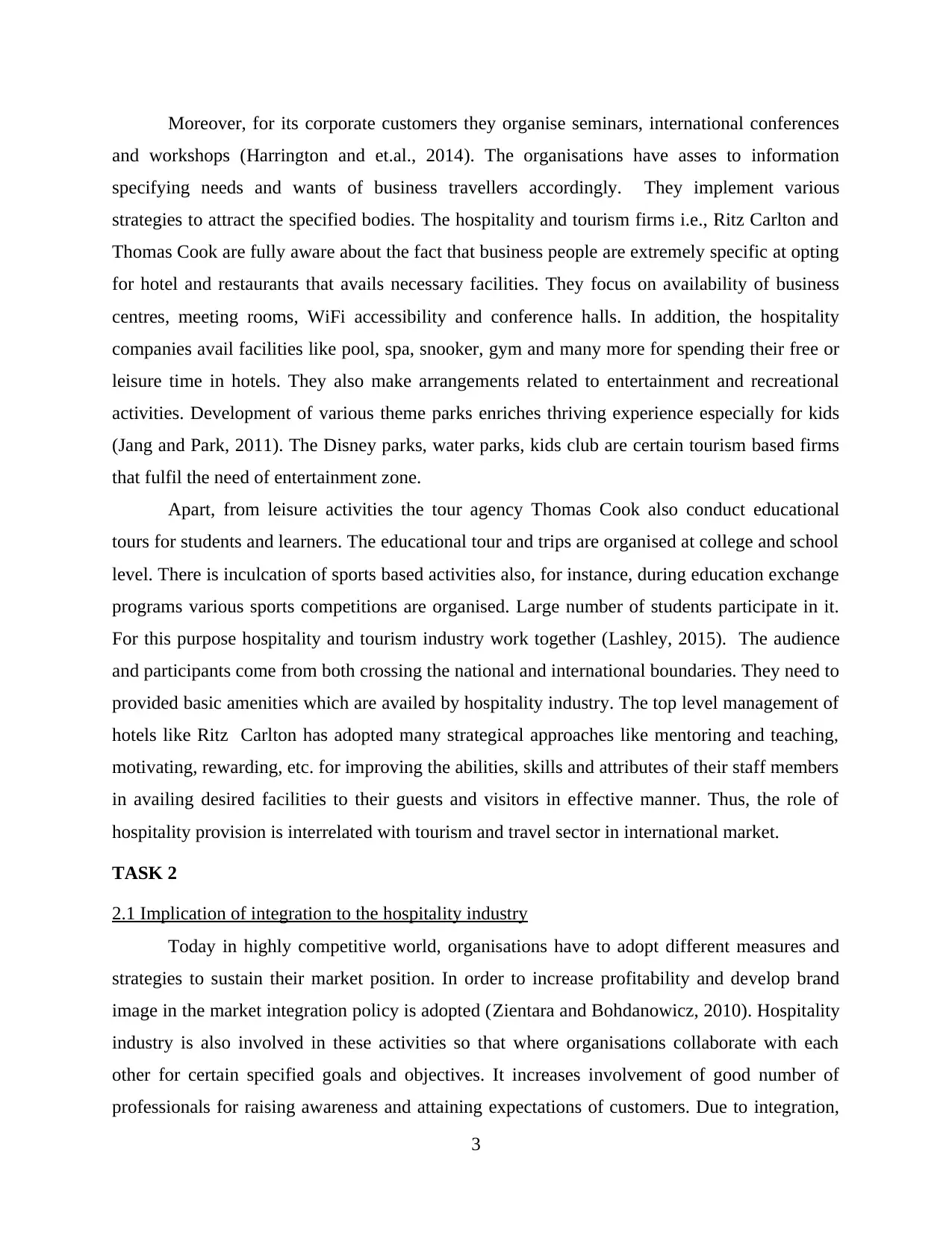
Moreover, for its corporate customers they organise seminars, international conferences
and workshops (Harrington and et.al., 2014). The organisations have asses to information
specifying needs and wants of business travellers accordingly. They implement various
strategies to attract the specified bodies. The hospitality and tourism firms i.e., Ritz Carlton and
Thomas Cook are fully aware about the fact that business people are extremely specific at opting
for hotel and restaurants that avails necessary facilities. They focus on availability of business
centres, meeting rooms, WiFi accessibility and conference halls. In addition, the hospitality
companies avail facilities like pool, spa, snooker, gym and many more for spending their free or
leisure time in hotels. They also make arrangements related to entertainment and recreational
activities. Development of various theme parks enriches thriving experience especially for kids
(Jang and Park, 2011). The Disney parks, water parks, kids club are certain tourism based firms
that fulfil the need of entertainment zone.
Apart, from leisure activities the tour agency Thomas Cook also conduct educational
tours for students and learners. The educational tour and trips are organised at college and school
level. There is inculcation of sports based activities also, for instance, during education exchange
programs various sports competitions are organised. Large number of students participate in it.
For this purpose hospitality and tourism industry work together (Lashley, 2015). The audience
and participants come from both crossing the national and international boundaries. They need to
provided basic amenities which are availed by hospitality industry. The top level management of
hotels like Ritz Carlton has adopted many strategical approaches like mentoring and teaching,
motivating, rewarding, etc. for improving the abilities, skills and attributes of their staff members
in availing desired facilities to their guests and visitors in effective manner. Thus, the role of
hospitality provision is interrelated with tourism and travel sector in international market.
TASK 2
2.1 Implication of integration to the hospitality industry
Today in highly competitive world, organisations have to adopt different measures and
strategies to sustain their market position. In order to increase profitability and develop brand
image in the market integration policy is adopted (Zientara and Bohdanowicz, 2010). Hospitality
industry is also involved in these activities so that where organisations collaborate with each
other for certain specified goals and objectives. It increases involvement of good number of
professionals for raising awareness and attaining expectations of customers. Due to integration,
3
and workshops (Harrington and et.al., 2014). The organisations have asses to information
specifying needs and wants of business travellers accordingly. They implement various
strategies to attract the specified bodies. The hospitality and tourism firms i.e., Ritz Carlton and
Thomas Cook are fully aware about the fact that business people are extremely specific at opting
for hotel and restaurants that avails necessary facilities. They focus on availability of business
centres, meeting rooms, WiFi accessibility and conference halls. In addition, the hospitality
companies avail facilities like pool, spa, snooker, gym and many more for spending their free or
leisure time in hotels. They also make arrangements related to entertainment and recreational
activities. Development of various theme parks enriches thriving experience especially for kids
(Jang and Park, 2011). The Disney parks, water parks, kids club are certain tourism based firms
that fulfil the need of entertainment zone.
Apart, from leisure activities the tour agency Thomas Cook also conduct educational
tours for students and learners. The educational tour and trips are organised at college and school
level. There is inculcation of sports based activities also, for instance, during education exchange
programs various sports competitions are organised. Large number of students participate in it.
For this purpose hospitality and tourism industry work together (Lashley, 2015). The audience
and participants come from both crossing the national and international boundaries. They need to
provided basic amenities which are availed by hospitality industry. The top level management of
hotels like Ritz Carlton has adopted many strategical approaches like mentoring and teaching,
motivating, rewarding, etc. for improving the abilities, skills and attributes of their staff members
in availing desired facilities to their guests and visitors in effective manner. Thus, the role of
hospitality provision is interrelated with tourism and travel sector in international market.
TASK 2
2.1 Implication of integration to the hospitality industry
Today in highly competitive world, organisations have to adopt different measures and
strategies to sustain their market position. In order to increase profitability and develop brand
image in the market integration policy is adopted (Zientara and Bohdanowicz, 2010). Hospitality
industry is also involved in these activities so that where organisations collaborate with each
other for certain specified goals and objectives. It increases involvement of good number of
professionals for raising awareness and attaining expectations of customers. Due to integration,
3
⊘ This is a preview!⊘
Do you want full access?
Subscribe today to unlock all pages.

Trusted by 1+ million students worldwide
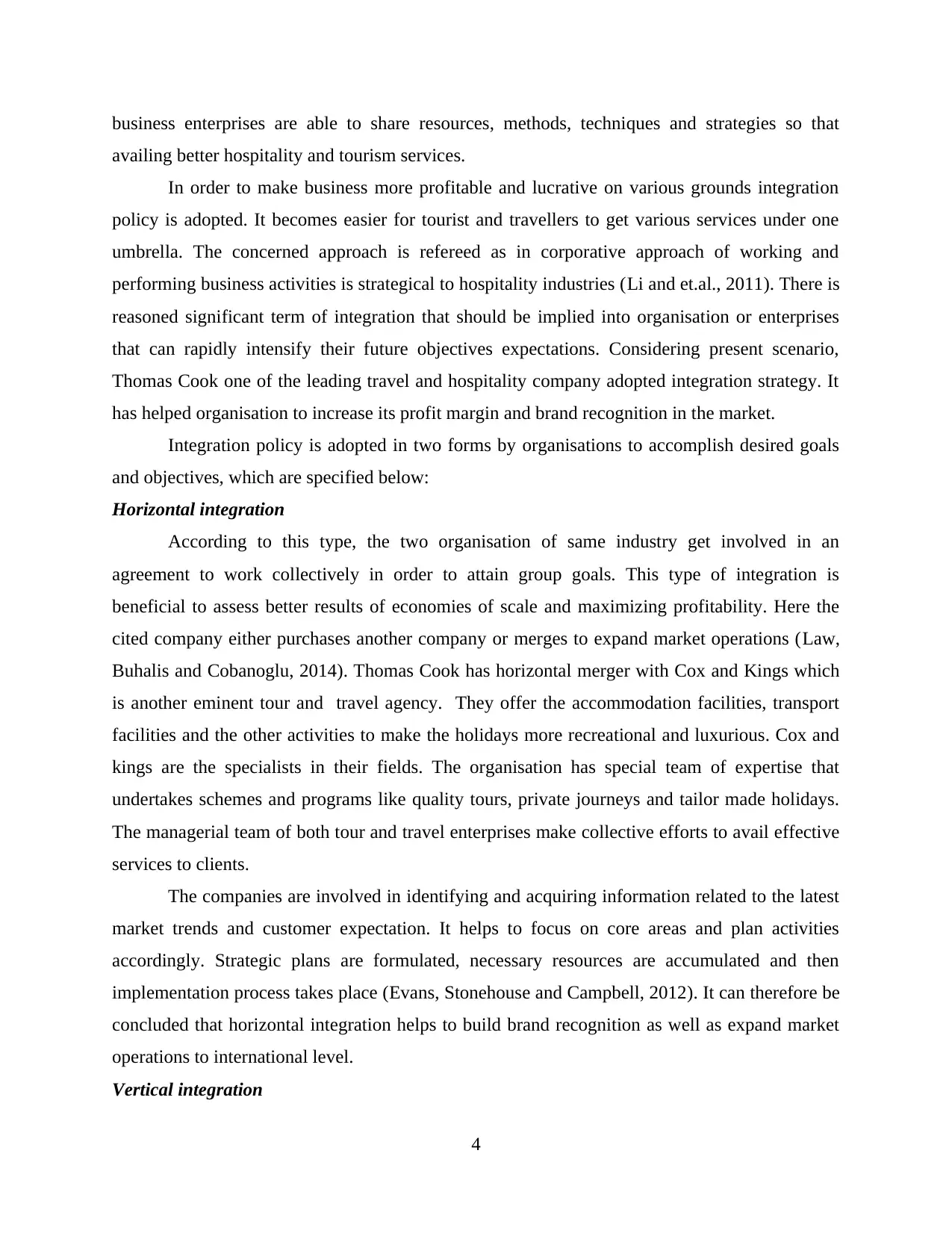
business enterprises are able to share resources, methods, techniques and strategies so that
availing better hospitality and tourism services.
In order to make business more profitable and lucrative on various grounds integration
policy is adopted. It becomes easier for tourist and travellers to get various services under one
umbrella. The concerned approach is refereed as in corporative approach of working and
performing business activities is strategical to hospitality industries (Li and et.al., 2011). There is
reasoned significant term of integration that should be implied into organisation or enterprises
that can rapidly intensify their future objectives expectations. Considering present scenario,
Thomas Cook one of the leading travel and hospitality company adopted integration strategy. It
has helped organisation to increase its profit margin and brand recognition in the market.
Integration policy is adopted in two forms by organisations to accomplish desired goals
and objectives, which are specified below:
Horizontal integration
According to this type, the two organisation of same industry get involved in an
agreement to work collectively in order to attain group goals. This type of integration is
beneficial to assess better results of economies of scale and maximizing profitability. Here the
cited company either purchases another company or merges to expand market operations (Law,
Buhalis and Cobanoglu, 2014). Thomas Cook has horizontal merger with Cox and Kings which
is another eminent tour and travel agency. They offer the accommodation facilities, transport
facilities and the other activities to make the holidays more recreational and luxurious. Cox and
kings are the specialists in their fields. The organisation has special team of expertise that
undertakes schemes and programs like quality tours, private journeys and tailor made holidays.
The managerial team of both tour and travel enterprises make collective efforts to avail effective
services to clients.
The companies are involved in identifying and acquiring information related to the latest
market trends and customer expectation. It helps to focus on core areas and plan activities
accordingly. Strategic plans are formulated, necessary resources are accumulated and then
implementation process takes place (Evans, Stonehouse and Campbell, 2012). It can therefore be
concluded that horizontal integration helps to build brand recognition as well as expand market
operations to international level.
Vertical integration
4
availing better hospitality and tourism services.
In order to make business more profitable and lucrative on various grounds integration
policy is adopted. It becomes easier for tourist and travellers to get various services under one
umbrella. The concerned approach is refereed as in corporative approach of working and
performing business activities is strategical to hospitality industries (Li and et.al., 2011). There is
reasoned significant term of integration that should be implied into organisation or enterprises
that can rapidly intensify their future objectives expectations. Considering present scenario,
Thomas Cook one of the leading travel and hospitality company adopted integration strategy. It
has helped organisation to increase its profit margin and brand recognition in the market.
Integration policy is adopted in two forms by organisations to accomplish desired goals
and objectives, which are specified below:
Horizontal integration
According to this type, the two organisation of same industry get involved in an
agreement to work collectively in order to attain group goals. This type of integration is
beneficial to assess better results of economies of scale and maximizing profitability. Here the
cited company either purchases another company or merges to expand market operations (Law,
Buhalis and Cobanoglu, 2014). Thomas Cook has horizontal merger with Cox and Kings which
is another eminent tour and travel agency. They offer the accommodation facilities, transport
facilities and the other activities to make the holidays more recreational and luxurious. Cox and
kings are the specialists in their fields. The organisation has special team of expertise that
undertakes schemes and programs like quality tours, private journeys and tailor made holidays.
The managerial team of both tour and travel enterprises make collective efforts to avail effective
services to clients.
The companies are involved in identifying and acquiring information related to the latest
market trends and customer expectation. It helps to focus on core areas and plan activities
accordingly. Strategic plans are formulated, necessary resources are accumulated and then
implementation process takes place (Evans, Stonehouse and Campbell, 2012). It can therefore be
concluded that horizontal integration helps to build brand recognition as well as expand market
operations to international level.
Vertical integration
4
Paraphrase This Document
Need a fresh take? Get an instant paraphrase of this document with our AI Paraphraser
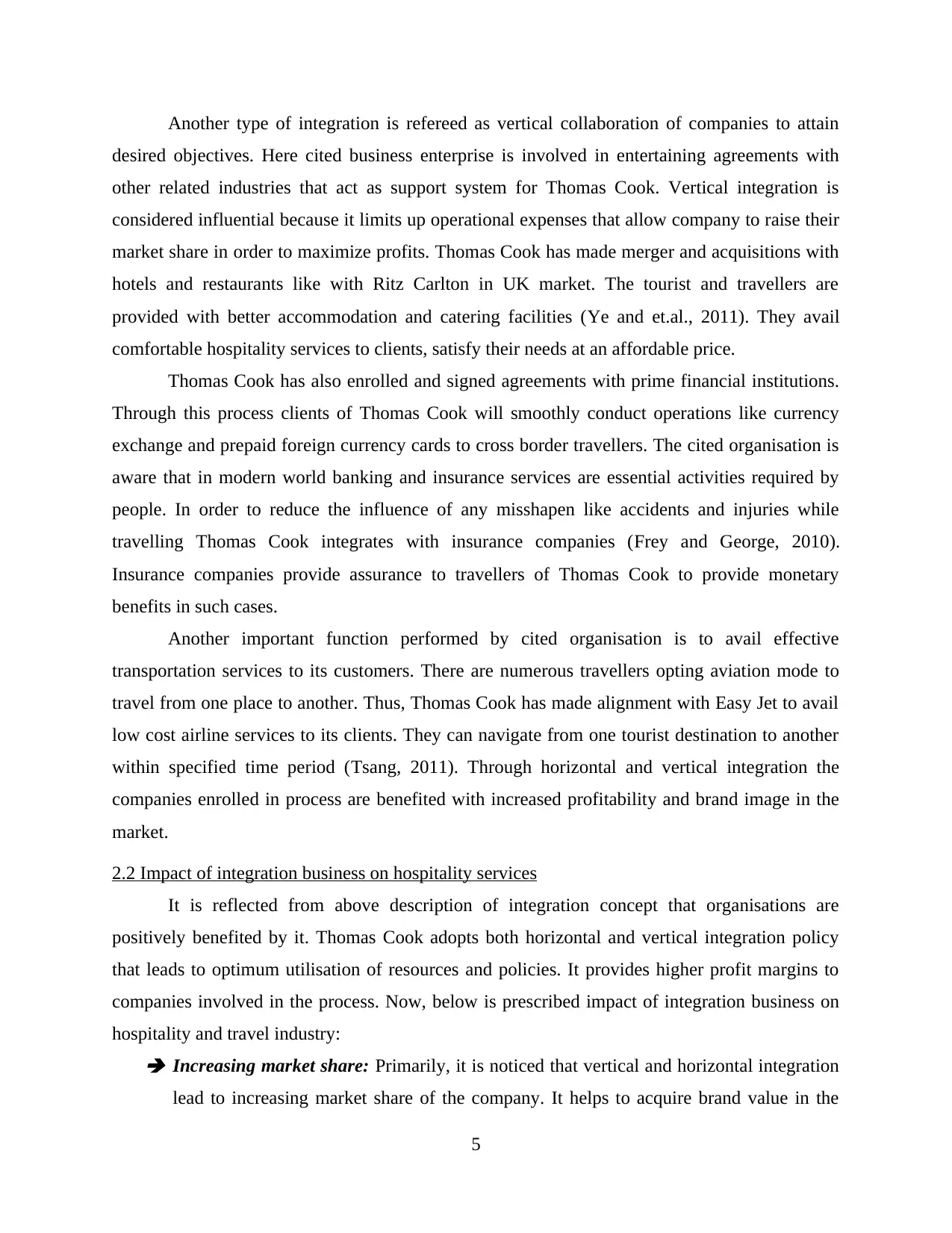
Another type of integration is refereed as vertical collaboration of companies to attain
desired objectives. Here cited business enterprise is involved in entertaining agreements with
other related industries that act as support system for Thomas Cook. Vertical integration is
considered influential because it limits up operational expenses that allow company to raise their
market share in order to maximize profits. Thomas Cook has made merger and acquisitions with
hotels and restaurants like with Ritz Carlton in UK market. The tourist and travellers are
provided with better accommodation and catering facilities (Ye and et.al., 2011). They avail
comfortable hospitality services to clients, satisfy their needs at an affordable price.
Thomas Cook has also enrolled and signed agreements with prime financial institutions.
Through this process clients of Thomas Cook will smoothly conduct operations like currency
exchange and prepaid foreign currency cards to cross border travellers. The cited organisation is
aware that in modern world banking and insurance services are essential activities required by
people. In order to reduce the influence of any misshapen like accidents and injuries while
travelling Thomas Cook integrates with insurance companies (Frey and George, 2010).
Insurance companies provide assurance to travellers of Thomas Cook to provide monetary
benefits in such cases.
Another important function performed by cited organisation is to avail effective
transportation services to its customers. There are numerous travellers opting aviation mode to
travel from one place to another. Thus, Thomas Cook has made alignment with Easy Jet to avail
low cost airline services to its clients. They can navigate from one tourist destination to another
within specified time period (Tsang, 2011). Through horizontal and vertical integration the
companies enrolled in process are benefited with increased profitability and brand image in the
market.
2.2 Impact of integration business on hospitality services
It is reflected from above description of integration concept that organisations are
positively benefited by it. Thomas Cook adopts both horizontal and vertical integration policy
that leads to optimum utilisation of resources and policies. It provides higher profit margins to
companies involved in the process. Now, below is prescribed impact of integration business on
hospitality and travel industry: Increasing market share: Primarily, it is noticed that vertical and horizontal integration
lead to increasing market share of the company. It helps to acquire brand value in the
5
desired objectives. Here cited business enterprise is involved in entertaining agreements with
other related industries that act as support system for Thomas Cook. Vertical integration is
considered influential because it limits up operational expenses that allow company to raise their
market share in order to maximize profits. Thomas Cook has made merger and acquisitions with
hotels and restaurants like with Ritz Carlton in UK market. The tourist and travellers are
provided with better accommodation and catering facilities (Ye and et.al., 2011). They avail
comfortable hospitality services to clients, satisfy their needs at an affordable price.
Thomas Cook has also enrolled and signed agreements with prime financial institutions.
Through this process clients of Thomas Cook will smoothly conduct operations like currency
exchange and prepaid foreign currency cards to cross border travellers. The cited organisation is
aware that in modern world banking and insurance services are essential activities required by
people. In order to reduce the influence of any misshapen like accidents and injuries while
travelling Thomas Cook integrates with insurance companies (Frey and George, 2010).
Insurance companies provide assurance to travellers of Thomas Cook to provide monetary
benefits in such cases.
Another important function performed by cited organisation is to avail effective
transportation services to its customers. There are numerous travellers opting aviation mode to
travel from one place to another. Thus, Thomas Cook has made alignment with Easy Jet to avail
low cost airline services to its clients. They can navigate from one tourist destination to another
within specified time period (Tsang, 2011). Through horizontal and vertical integration the
companies enrolled in process are benefited with increased profitability and brand image in the
market.
2.2 Impact of integration business on hospitality services
It is reflected from above description of integration concept that organisations are
positively benefited by it. Thomas Cook adopts both horizontal and vertical integration policy
that leads to optimum utilisation of resources and policies. It provides higher profit margins to
companies involved in the process. Now, below is prescribed impact of integration business on
hospitality and travel industry: Increasing market share: Primarily, it is noticed that vertical and horizontal integration
lead to increasing market share of the company. It helps to acquire brand value in the
5
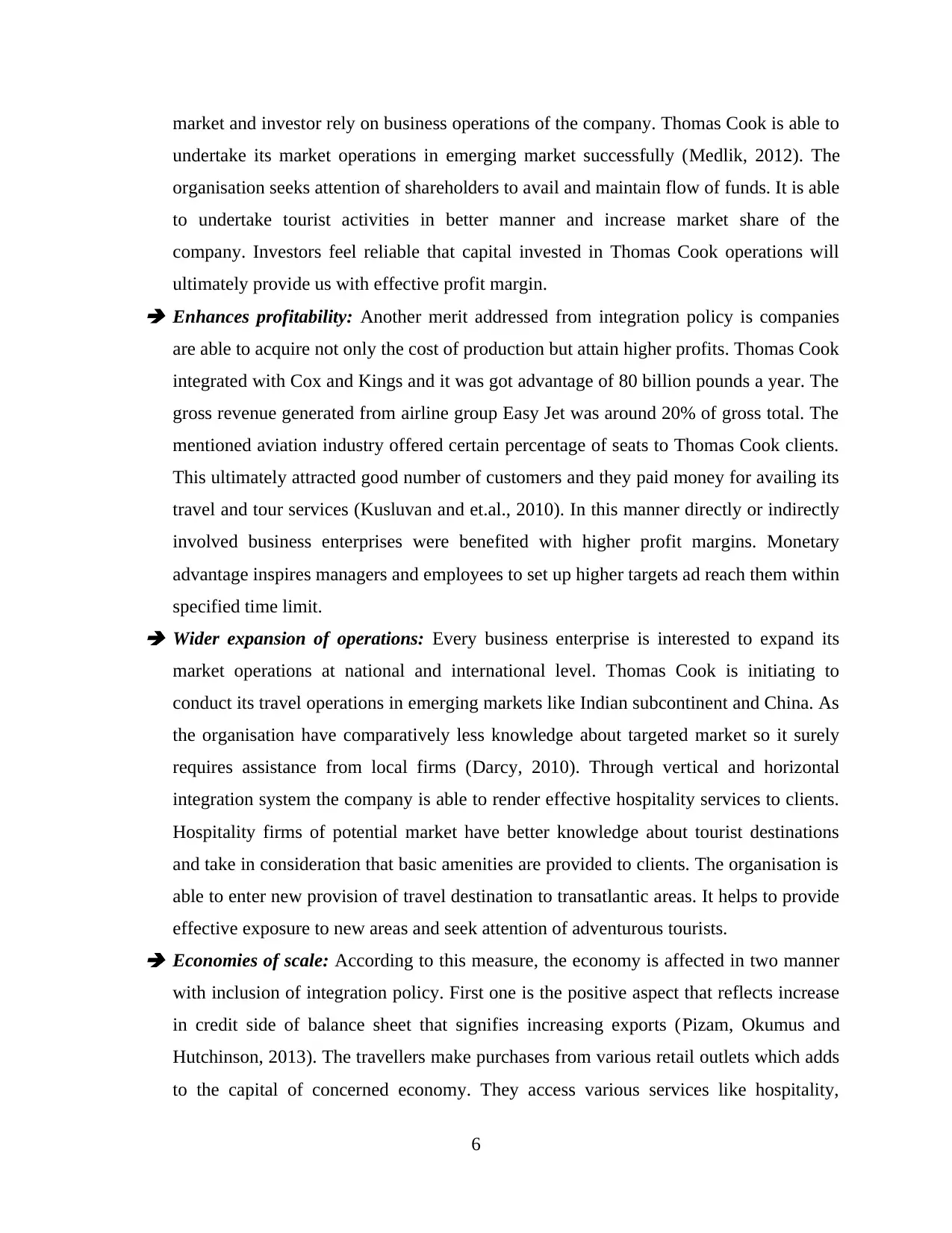
market and investor rely on business operations of the company. Thomas Cook is able to
undertake its market operations in emerging market successfully (Medlik, 2012). The
organisation seeks attention of shareholders to avail and maintain flow of funds. It is able
to undertake tourist activities in better manner and increase market share of the
company. Investors feel reliable that capital invested in Thomas Cook operations will
ultimately provide us with effective profit margin. Enhances profitability: Another merit addressed from integration policy is companies
are able to acquire not only the cost of production but attain higher profits. Thomas Cook
integrated with Cox and Kings and it was got advantage of 80 billion pounds a year. The
gross revenue generated from airline group Easy Jet was around 20% of gross total. The
mentioned aviation industry offered certain percentage of seats to Thomas Cook clients.
This ultimately attracted good number of customers and they paid money for availing its
travel and tour services (Kusluvan and et.al., 2010). In this manner directly or indirectly
involved business enterprises were benefited with higher profit margins. Monetary
advantage inspires managers and employees to set up higher targets ad reach them within
specified time limit. Wider expansion of operations: Every business enterprise is interested to expand its
market operations at national and international level. Thomas Cook is initiating to
conduct its travel operations in emerging markets like Indian subcontinent and China. As
the organisation have comparatively less knowledge about targeted market so it surely
requires assistance from local firms (Darcy, 2010). Through vertical and horizontal
integration system the company is able to render effective hospitality services to clients.
Hospitality firms of potential market have better knowledge about tourist destinations
and take in consideration that basic amenities are provided to clients. The organisation is
able to enter new provision of travel destination to transatlantic areas. It helps to provide
effective exposure to new areas and seek attention of adventurous tourists. Economies of scale: According to this measure, the economy is affected in two manner
with inclusion of integration policy. First one is the positive aspect that reflects increase
in credit side of balance sheet that signifies increasing exports (Pizam, Okumus and
Hutchinson, 2013). The travellers make purchases from various retail outlets which adds
to the capital of concerned economy. They access various services like hospitality,
6
undertake its market operations in emerging market successfully (Medlik, 2012). The
organisation seeks attention of shareholders to avail and maintain flow of funds. It is able
to undertake tourist activities in better manner and increase market share of the
company. Investors feel reliable that capital invested in Thomas Cook operations will
ultimately provide us with effective profit margin. Enhances profitability: Another merit addressed from integration policy is companies
are able to acquire not only the cost of production but attain higher profits. Thomas Cook
integrated with Cox and Kings and it was got advantage of 80 billion pounds a year. The
gross revenue generated from airline group Easy Jet was around 20% of gross total. The
mentioned aviation industry offered certain percentage of seats to Thomas Cook clients.
This ultimately attracted good number of customers and they paid money for availing its
travel and tour services (Kusluvan and et.al., 2010). In this manner directly or indirectly
involved business enterprises were benefited with higher profit margins. Monetary
advantage inspires managers and employees to set up higher targets ad reach them within
specified time limit. Wider expansion of operations: Every business enterprise is interested to expand its
market operations at national and international level. Thomas Cook is initiating to
conduct its travel operations in emerging markets like Indian subcontinent and China. As
the organisation have comparatively less knowledge about targeted market so it surely
requires assistance from local firms (Darcy, 2010). Through vertical and horizontal
integration system the company is able to render effective hospitality services to clients.
Hospitality firms of potential market have better knowledge about tourist destinations
and take in consideration that basic amenities are provided to clients. The organisation is
able to enter new provision of travel destination to transatlantic areas. It helps to provide
effective exposure to new areas and seek attention of adventurous tourists. Economies of scale: According to this measure, the economy is affected in two manner
with inclusion of integration policy. First one is the positive aspect that reflects increase
in credit side of balance sheet that signifies increasing exports (Pizam, Okumus and
Hutchinson, 2013). The travellers make purchases from various retail outlets which adds
to the capital of concerned economy. They access various services like hospitality,
6
⊘ This is a preview!⊘
Do you want full access?
Subscribe today to unlock all pages.

Trusted by 1+ million students worldwide
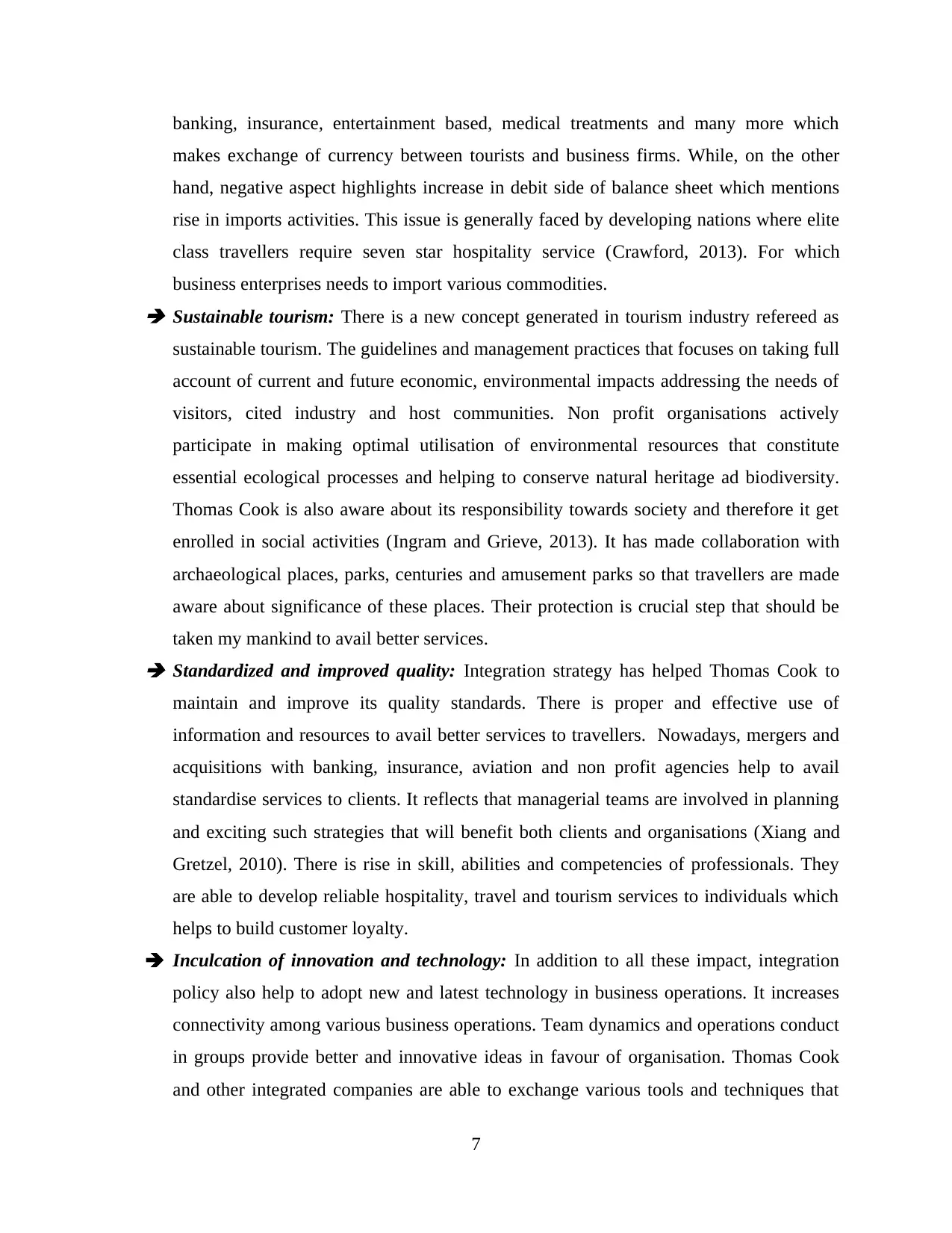
banking, insurance, entertainment based, medical treatments and many more which
makes exchange of currency between tourists and business firms. While, on the other
hand, negative aspect highlights increase in debit side of balance sheet which mentions
rise in imports activities. This issue is generally faced by developing nations where elite
class travellers require seven star hospitality service (Crawford, 2013). For which
business enterprises needs to import various commodities. Sustainable tourism: There is a new concept generated in tourism industry refereed as
sustainable tourism. The guidelines and management practices that focuses on taking full
account of current and future economic, environmental impacts addressing the needs of
visitors, cited industry and host communities. Non profit organisations actively
participate in making optimal utilisation of environmental resources that constitute
essential ecological processes and helping to conserve natural heritage ad biodiversity.
Thomas Cook is also aware about its responsibility towards society and therefore it get
enrolled in social activities (Ingram and Grieve, 2013). It has made collaboration with
archaeological places, parks, centuries and amusement parks so that travellers are made
aware about significance of these places. Their protection is crucial step that should be
taken my mankind to avail better services. Standardized and improved quality: Integration strategy has helped Thomas Cook to
maintain and improve its quality standards. There is proper and effective use of
information and resources to avail better services to travellers. Nowadays, mergers and
acquisitions with banking, insurance, aviation and non profit agencies help to avail
standardise services to clients. It reflects that managerial teams are involved in planning
and exciting such strategies that will benefit both clients and organisations (Xiang and
Gretzel, 2010). There is rise in skill, abilities and competencies of professionals. They
are able to develop reliable hospitality, travel and tourism services to individuals which
helps to build customer loyalty.
Inculcation of innovation and technology: In addition to all these impact, integration
policy also help to adopt new and latest technology in business operations. It increases
connectivity among various business operations. Team dynamics and operations conduct
in groups provide better and innovative ideas in favour of organisation. Thomas Cook
and other integrated companies are able to exchange various tools and techniques that
7
makes exchange of currency between tourists and business firms. While, on the other
hand, negative aspect highlights increase in debit side of balance sheet which mentions
rise in imports activities. This issue is generally faced by developing nations where elite
class travellers require seven star hospitality service (Crawford, 2013). For which
business enterprises needs to import various commodities. Sustainable tourism: There is a new concept generated in tourism industry refereed as
sustainable tourism. The guidelines and management practices that focuses on taking full
account of current and future economic, environmental impacts addressing the needs of
visitors, cited industry and host communities. Non profit organisations actively
participate in making optimal utilisation of environmental resources that constitute
essential ecological processes and helping to conserve natural heritage ad biodiversity.
Thomas Cook is also aware about its responsibility towards society and therefore it get
enrolled in social activities (Ingram and Grieve, 2013). It has made collaboration with
archaeological places, parks, centuries and amusement parks so that travellers are made
aware about significance of these places. Their protection is crucial step that should be
taken my mankind to avail better services. Standardized and improved quality: Integration strategy has helped Thomas Cook to
maintain and improve its quality standards. There is proper and effective use of
information and resources to avail better services to travellers. Nowadays, mergers and
acquisitions with banking, insurance, aviation and non profit agencies help to avail
standardise services to clients. It reflects that managerial teams are involved in planning
and exciting such strategies that will benefit both clients and organisations (Xiang and
Gretzel, 2010). There is rise in skill, abilities and competencies of professionals. They
are able to develop reliable hospitality, travel and tourism services to individuals which
helps to build customer loyalty.
Inculcation of innovation and technology: In addition to all these impact, integration
policy also help to adopt new and latest technology in business operations. It increases
connectivity among various business operations. Team dynamics and operations conduct
in groups provide better and innovative ideas in favour of organisation. Thomas Cook
and other integrated companies are able to exchange various tools and techniques that
7
Paraphrase This Document
Need a fresh take? Get an instant paraphrase of this document with our AI Paraphraser
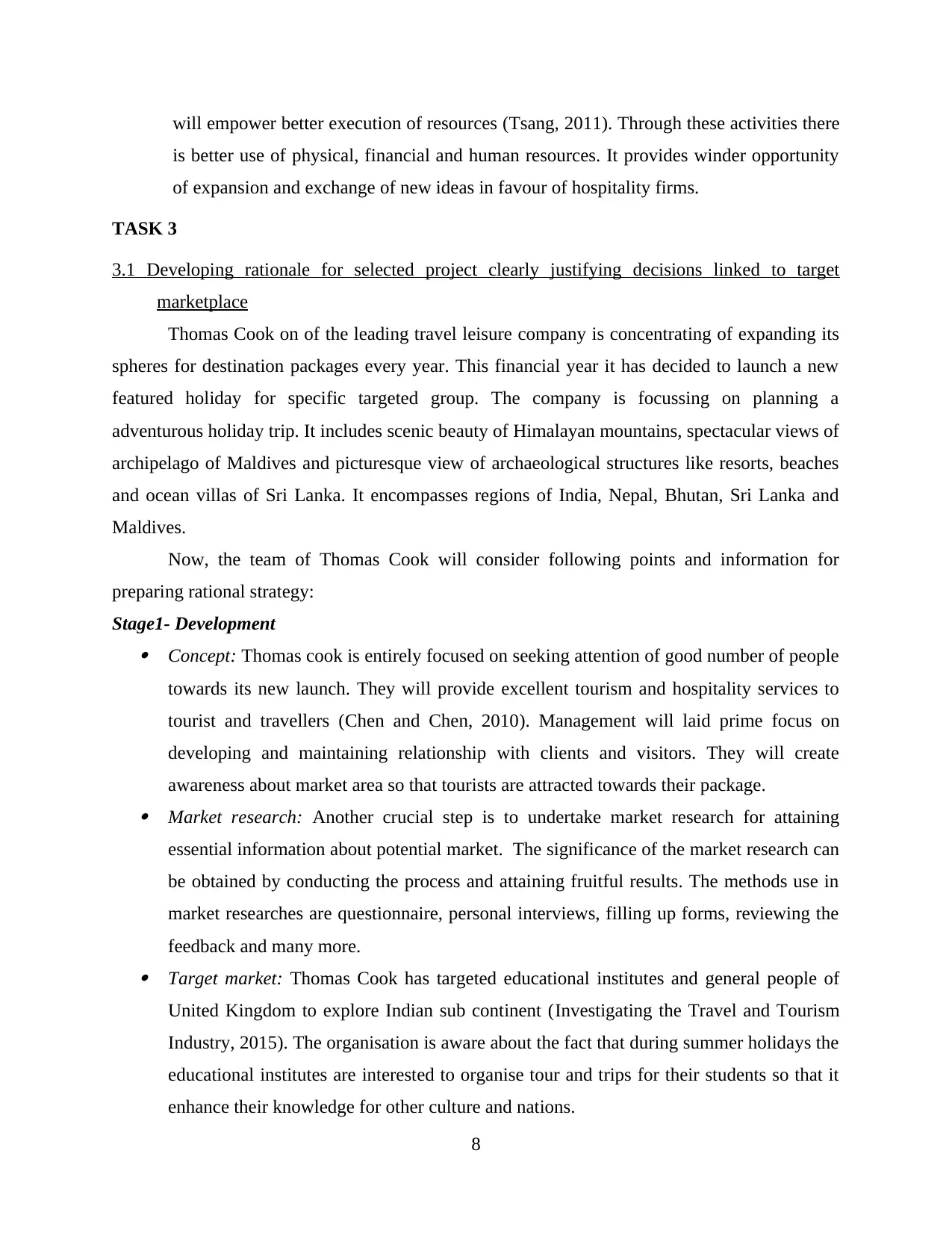
will empower better execution of resources (Tsang, 2011). Through these activities there
is better use of physical, financial and human resources. It provides winder opportunity
of expansion and exchange of new ideas in favour of hospitality firms.
TASK 3
3.1 Developing rationale for selected project clearly justifying decisions linked to target
marketplace
Thomas Cook on of the leading travel leisure company is concentrating of expanding its
spheres for destination packages every year. This financial year it has decided to launch a new
featured holiday for specific targeted group. The company is focussing on planning a
adventurous holiday trip. It includes scenic beauty of Himalayan mountains, spectacular views of
archipelago of Maldives and picturesque view of archaeological structures like resorts, beaches
and ocean villas of Sri Lanka. It encompasses regions of India, Nepal, Bhutan, Sri Lanka and
Maldives.
Now, the team of Thomas Cook will consider following points and information for
preparing rational strategy:
Stage1- Development Concept: Thomas cook is entirely focused on seeking attention of good number of people
towards its new launch. They will provide excellent tourism and hospitality services to
tourist and travellers (Chen and Chen, 2010). Management will laid prime focus on
developing and maintaining relationship with clients and visitors. They will create
awareness about market area so that tourists are attracted towards their package. Market research: Another crucial step is to undertake market research for attaining
essential information about potential market. The significance of the market research can
be obtained by conducting the process and attaining fruitful results. The methods use in
market researches are questionnaire, personal interviews, filling up forms, reviewing the
feedback and many more. Target market: Thomas Cook has targeted educational institutes and general people of
United Kingdom to explore Indian sub continent (Investigating the Travel and Tourism
Industry, 2015). The organisation is aware about the fact that during summer holidays the
educational institutes are interested to organise tour and trips for their students so that it
enhance their knowledge for other culture and nations.
8
is better use of physical, financial and human resources. It provides winder opportunity
of expansion and exchange of new ideas in favour of hospitality firms.
TASK 3
3.1 Developing rationale for selected project clearly justifying decisions linked to target
marketplace
Thomas Cook on of the leading travel leisure company is concentrating of expanding its
spheres for destination packages every year. This financial year it has decided to launch a new
featured holiday for specific targeted group. The company is focussing on planning a
adventurous holiday trip. It includes scenic beauty of Himalayan mountains, spectacular views of
archipelago of Maldives and picturesque view of archaeological structures like resorts, beaches
and ocean villas of Sri Lanka. It encompasses regions of India, Nepal, Bhutan, Sri Lanka and
Maldives.
Now, the team of Thomas Cook will consider following points and information for
preparing rational strategy:
Stage1- Development Concept: Thomas cook is entirely focused on seeking attention of good number of people
towards its new launch. They will provide excellent tourism and hospitality services to
tourist and travellers (Chen and Chen, 2010). Management will laid prime focus on
developing and maintaining relationship with clients and visitors. They will create
awareness about market area so that tourists are attracted towards their package. Market research: Another crucial step is to undertake market research for attaining
essential information about potential market. The significance of the market research can
be obtained by conducting the process and attaining fruitful results. The methods use in
market researches are questionnaire, personal interviews, filling up forms, reviewing the
feedback and many more. Target market: Thomas Cook has targeted educational institutes and general people of
United Kingdom to explore Indian sub continent (Investigating the Travel and Tourism
Industry, 2015). The organisation is aware about the fact that during summer holidays the
educational institutes are interested to organise tour and trips for their students so that it
enhance their knowledge for other culture and nations.
8
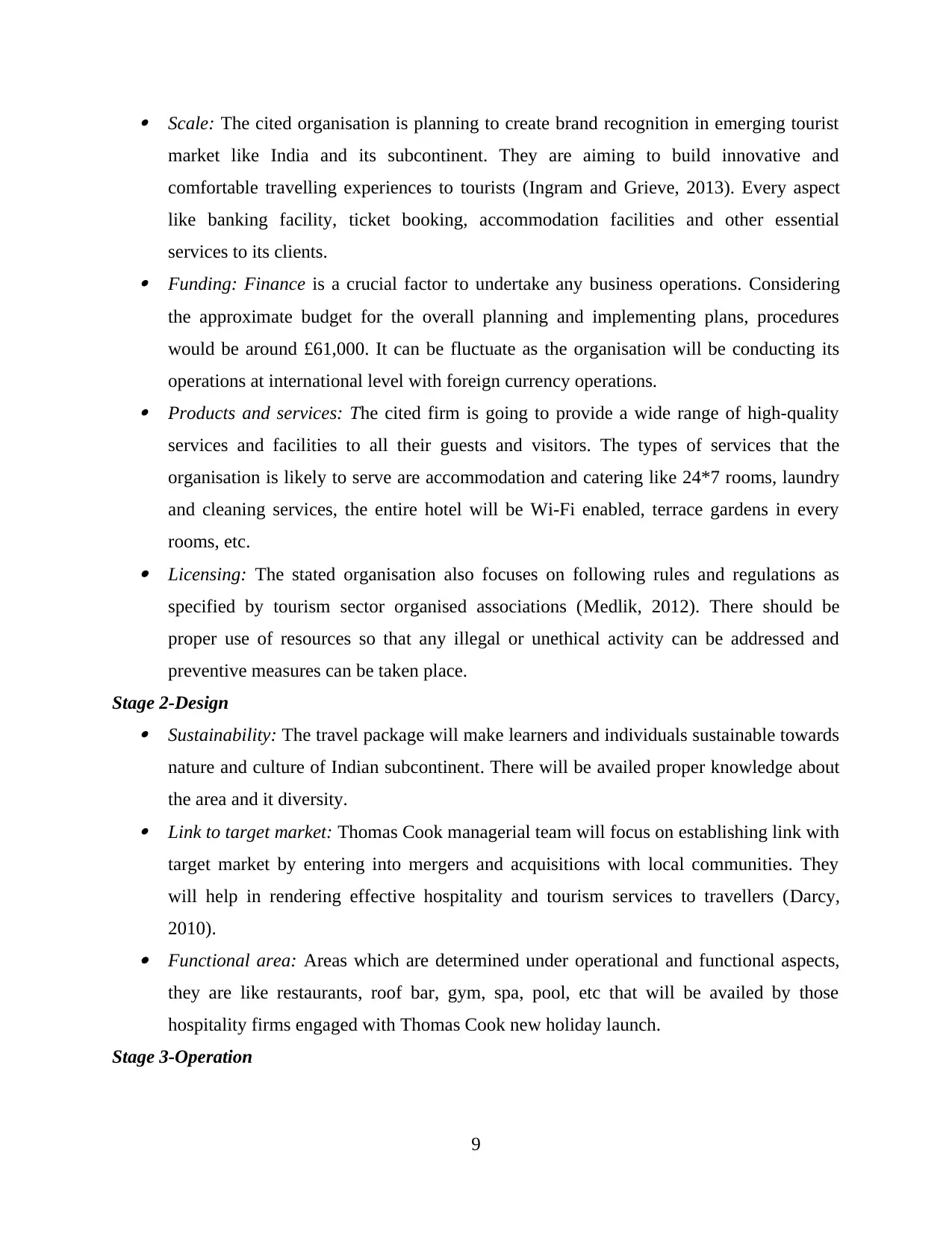
Scale: The cited organisation is planning to create brand recognition in emerging tourist
market like India and its subcontinent. They are aiming to build innovative and
comfortable travelling experiences to tourists (Ingram and Grieve, 2013). Every aspect
like banking facility, ticket booking, accommodation facilities and other essential
services to its clients. Funding: Finance is a crucial factor to undertake any business operations. Considering
the approximate budget for the overall planning and implementing plans, procedures
would be around £61,000. It can be fluctuate as the organisation will be conducting its
operations at international level with foreign currency operations. Products and services: The cited firm is going to provide a wide range of high-quality
services and facilities to all their guests and visitors. The types of services that the
organisation is likely to serve are accommodation and catering like 24*7 rooms, laundry
and cleaning services, the entire hotel will be Wi-Fi enabled, terrace gardens in every
rooms, etc. Licensing: The stated organisation also focuses on following rules and regulations as
specified by tourism sector organised associations (Medlik, 2012). There should be
proper use of resources so that any illegal or unethical activity can be addressed and
preventive measures can be taken place.
Stage 2-Design Sustainability: The travel package will make learners and individuals sustainable towards
nature and culture of Indian subcontinent. There will be availed proper knowledge about
the area and it diversity. Link to target market: Thomas Cook managerial team will focus on establishing link with
target market by entering into mergers and acquisitions with local communities. They
will help in rendering effective hospitality and tourism services to travellers (Darcy,
2010). Functional area: Areas which are determined under operational and functional aspects,
they are like restaurants, roof bar, gym, spa, pool, etc that will be availed by those
hospitality firms engaged with Thomas Cook new holiday launch.
Stage 3-Operation
9
market like India and its subcontinent. They are aiming to build innovative and
comfortable travelling experiences to tourists (Ingram and Grieve, 2013). Every aspect
like banking facility, ticket booking, accommodation facilities and other essential
services to its clients. Funding: Finance is a crucial factor to undertake any business operations. Considering
the approximate budget for the overall planning and implementing plans, procedures
would be around £61,000. It can be fluctuate as the organisation will be conducting its
operations at international level with foreign currency operations. Products and services: The cited firm is going to provide a wide range of high-quality
services and facilities to all their guests and visitors. The types of services that the
organisation is likely to serve are accommodation and catering like 24*7 rooms, laundry
and cleaning services, the entire hotel will be Wi-Fi enabled, terrace gardens in every
rooms, etc. Licensing: The stated organisation also focuses on following rules and regulations as
specified by tourism sector organised associations (Medlik, 2012). There should be
proper use of resources so that any illegal or unethical activity can be addressed and
preventive measures can be taken place.
Stage 2-Design Sustainability: The travel package will make learners and individuals sustainable towards
nature and culture of Indian subcontinent. There will be availed proper knowledge about
the area and it diversity. Link to target market: Thomas Cook managerial team will focus on establishing link with
target market by entering into mergers and acquisitions with local communities. They
will help in rendering effective hospitality and tourism services to travellers (Darcy,
2010). Functional area: Areas which are determined under operational and functional aspects,
they are like restaurants, roof bar, gym, spa, pool, etc that will be availed by those
hospitality firms engaged with Thomas Cook new holiday launch.
Stage 3-Operation
9
⊘ This is a preview!⊘
Do you want full access?
Subscribe today to unlock all pages.

Trusted by 1+ million students worldwide
1 out of 18
Related Documents
Your All-in-One AI-Powered Toolkit for Academic Success.
+13062052269
info@desklib.com
Available 24*7 on WhatsApp / Email
![[object Object]](/_next/static/media/star-bottom.7253800d.svg)
Unlock your academic potential
Copyright © 2020–2026 A2Z Services. All Rights Reserved. Developed and managed by ZUCOL.





